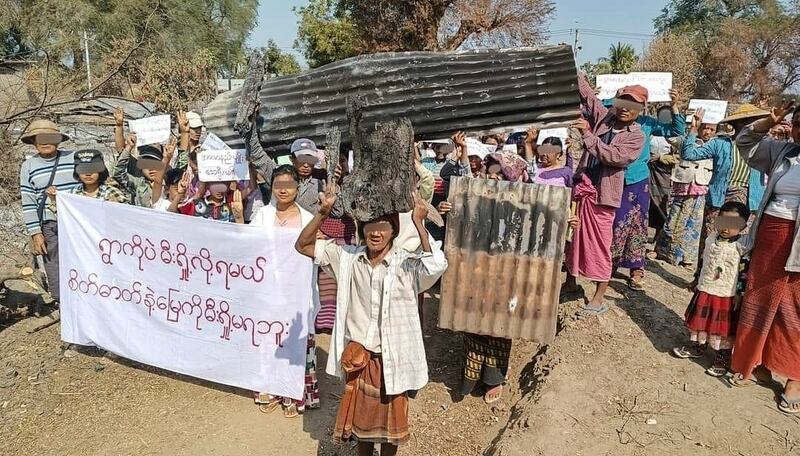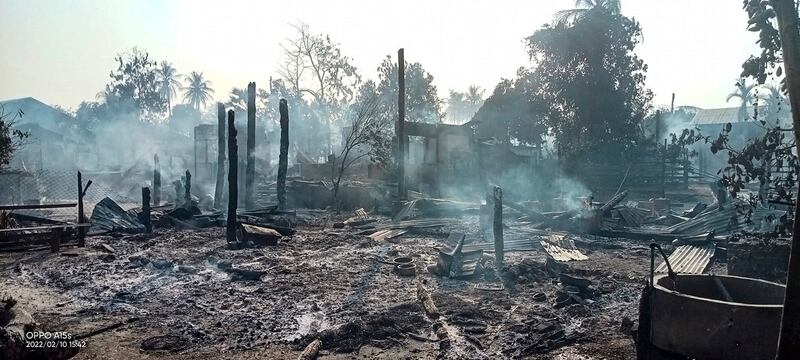Holding up charred remnants of destroyed homes, defiant villagers targeted in arson attacks by pro-junta forces in northwestern Myanmar staged a protest Friday against the “fascist army” that is leaving a widening trail of destruction in their rural township.
Protesters came from four villages in Pale township, Sagaing region, where more than 1,100 houses have been burned to the ground in the past two weeks, according to residents – part of a scorched earth campaign in apparent retaliation for attacks by anti-junta People’s Defense Force militia on junta forces. RFA has verified the destruction of each of those four villages through commercial satellite imagery.
"Only the village can be burned down, not the spirit!" scores of villagers chanted, as they marched down a narrow dirt track, responding to the cues of a protest leader. “We will not be military slaves. We will revolt!”
As is often the case with demonstrations in war-hit Myanmar, footage of the protest surfaced on social media, via a Facebook page that once carried news about entertainment in the township, but now posts content from anti-junta activists.

The protesters, making the three-finger salute adopted by opponents of the military, carried two red and gold peacock flags of the National League for Democracy, the party of Aung San Suu Kyi. Her civilian government was toppled in a military coup one year ago that has plunged Myanmar into a deepening civil conflict – including in this corner of Sagaing, which has become a hub of anti-junta resistance. One protester carried a banner reading: "Cut out the roots of the Fascist Army!"
“The villagers want to show that their spirit has not been diminished by the arson attacks,” said one Pale resident contacted by RFA. The resident, who declined to be named for safety reasons, said hundreds of people joined the demonstration near one of the burned villages, but declined to give the exact location in case there was further retribution.
“It was aimed to let the public and international community know that the victim villagers are very strong-willed and undefeated even though they were killed, arrested, displaced and their homes and villages were burned down and their lives destroyed,” the resident said.
The arson campaign, which has forced thousands to flee, has extended to Sagaing’s Mingin township to the north, where another 270 houses were destroyed in fires set by Myanmar troops and pro-junta militia on Thursday in two neighboring villages, local residents said. Four villagers were killed at a nearby village, they said.
Another 130 houses were destroyed in Mingin township on Feb. 2, meaning that at least 1,500 houses have been razed in Pale and Mingin since Jan. 31. In the Feb. 2 attack, Bin village lost about 100 homes. Aerial photos of the settlement show a gold-colored Buddhist stupa surrounded by ashen remains of destroyed homes.
In Thursday’s attack, residents say more than 100 houses were destroyed in Mauktet village, and more than 170 houses in Moktha village, which lies just half-a-mile to the north.

That followed a Wednesday night clash between local PDF militia and military troops stationed in Salal Kin village, near Moktha.
A local resident said that around 5 a.m. on Thursday, 80 military troops and pro-junta Pyu Saw Htee militia, which are stationed in Pan Set, Taung Phyu and Salal Kin villages in Mingin township, raided Mauktet village and set fire to houses without a warning and without firing a shot.
“Only brick houses are left in the village. All other houses got burned down,” said the resident, who like all the other sources in this article sought anonymity for safety reasons.
The same afternoon, pro-junta forces assaulted Moktha village. Residents had no time to pack up their belongings as they fled.
“At around 3 p.m. yesterday, the military troops started the assault,” a villager in Moktha said on Friday. “All the local villagers have fled into the jungle. Nobody has returned yet ….We’ve got nothing but the clothes on our backs. There’s nothing left at home as it all got burned down.”
An aid group volunteer helping the villagers said their plight remains especially precarious as the pro-junta Pyu Saw Htee militia are still active in the area and making it difficult to deliver supplies.
“We are trying to help them as much as we can. We have to use middle men to help the people from Moktha and Mauktet villages. We cannot go there by ourselves. It is not safe to travel because Pyu Saw Htee militia are active in these areas,” the volunteer said.
More than 10,000 people from Moktha, Mauktet, Nga Nan Dar and Kyun Taw villages in Mingin have reportedly fled their homes. Four people who were assigned as watchmen at Nga Nan Dar village were killed when troops arrived there, local residents said, and another villager was killed and his wife was missing.
RFA reported on Wednesday that at least 38 civilians, including women and children, had been killed by the military in four townships in Sagaing region in a span of 10 days since late January, according to residents and PDF members.
The research group Data for Myanmar, which documents the impact of the armed conflict, said that as of Feb. 4, the junta forces had burned down at least 3,379 homes in 126 villages and towns in nine regions and states in the year since the military seized power in the Feb. 1, 2021, coup.
The junta’s spokesman has not responded to repeated calls from RFA seeking comment about the village burnings in Sagaing. Customarily, the military denies setting fire to villages and blames anti-junta militia instead.
Reported by Myanmar Service. Translated by Ye Kaung Myint Maung. Written in English by Matthew Pennington
